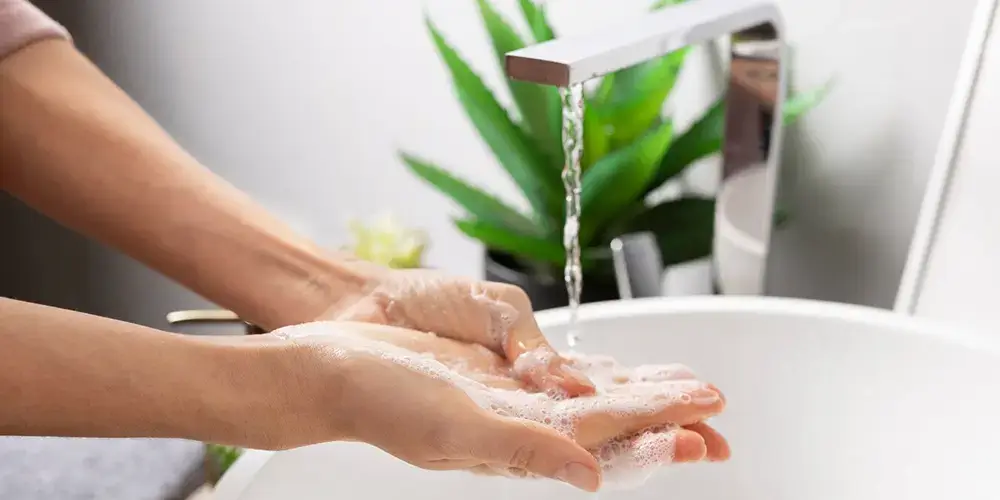

The Clean Mind: Exploring the Impact of Hygiene on Mental Well-being
16/03/2024 Richard P. 1278
In the pursuit of mental well-being, we often focus on practices such as mindfulness, therapy, and self-care routines. While these are undoubtedly important, one aspect that is sometimes overlooked is the role of hygiene in maintaining psychological health. The state of our surroundings and personal cleanliness can have a profound impact on our mood, stress levels, and overall mental well-being. In this blog post, we'll explore the relationship between hygiene and mental health, discussing how maintaining cleanliness and order in one's environment can contribute to reduced stress and improved mood.
The Power of a Clean Environment
Have you ever noticed how clutter and messiness in your environment can contribute to feelings of stress and overwhelm? Research has shown that a disorganized and unkempt living or working space can have a negative impact on mental health. On the other hand, maintaining a clean and tidy environment can promote a sense of calm and order, leading to improved psychological well-being. Here's how cleanliness in our surroundings can influence our mental state:
Reduced Stress and Anxiety: Clutter and messiness can create visual chaos, which can be overwhelming to the senses and contribute to feelings of stress and anxiety. By keeping our surroundings clean and organized, we create a sense of order and control that can help reduce stress levels and promote relaxation.
Improved Concentration and Focus: A clutter-free environment can make it easier to focus on tasks and activities without distractions. When our surroundings are clean and tidy, our minds are free to concentrate on the present moment, leading to improved productivity and mental clarity.
Enhanced Mood and Emotional Well-being: Studies have shown that people who live in clean and organized environments tend to report higher levels of happiness and life satisfaction. A clean and tidy space can uplift our mood, boost our energy levels, and promote a sense of well-being.
Personal Hygiene and Self-esteem
In addition to our physical surroundings, personal hygiene also plays a significant role in mental well-being. Maintaining good personal hygiene habits, such as regular bathing, grooming, and dental care, not only promotes physical health but also boosts self-esteem and confidence. Here's how personal hygiene practices can impact mental health:
Boosted Self-confidence: When we look and feel clean and well-groomed, we are more likely to feel confident and comfortable in our own skin. Good personal hygiene can help us present our best selves to the world, leading to greater self-esteem and self-assurance.
Reduced Social Anxiety: Poor personal hygiene can contribute to feelings of embarrassment and self-consciousness in social situations. By taking care of our personal hygiene, we can feel more confident in social interactions and reduce feelings of social anxiety and isolation.
Improved Mental Health Awareness: Practicing good personal hygiene requires self-awareness and self-care, which are essential components of mental health. By prioritizing personal hygiene, we cultivate a greater sense of self-respect and self-care, leading to improved overall mental well-being.
Practical Tips for Maintaining Hygiene for Mental Health
Now that we understand the importance of hygiene for mental health, let's explore some practical tips for incorporating cleanliness into our daily lives:
Create a Cleaning Routine: Establish a regular cleaning routine for your living or working space, including tasks such as dusting, vacuuming, and organizing clutter. Breaking tasks down into manageable chunks can make them feel less overwhelming.
Practice Mindful Cleaning: Approach cleaning as a form of mindfulness practice, focusing on the present moment and the sensations of cleaning. Pay attention to the sights, sounds, and smells of your environment as you clean, allowing yourself to fully immerse in the experience.
Prioritize Personal Hygiene: Make personal hygiene a priority by establishing a daily routine that includes bathing, grooming, and dental care. Set aside time each day for self-care activities that promote physical and mental well-being.
Declutter Your Space: Take time to declutter your living or working space, removing items that no longer serve you or bring you joy. Clearing out clutter can create a sense of space and freedom, allowing energy to flow more freely and promoting mental clarity.
Seek Support When Needed: If you struggle with maintaining hygiene due to mental health challenges such as depression or anxiety, don't hesitate to seek support from a therapist or mental health professional. They can provide strategies and resources to help you overcome obstacles and improve your overall well-being.
Maintaining cleanliness and order in our environment and personal hygiene practices can have a significant impact on our mental health and well-being. By creating clean and organized surroundings, we can reduce stress, improve concentration, and enhance mood. Likewise, prioritizing personal hygiene promotes self-confidence, self-esteem, and self-care, leading to improved overall mental wellness. As we cultivate habits of cleanliness and hygiene in our daily lives, may we find greater peace, clarity, and contentment within ourselves and our surroundings.
Recent Blogs
Building a Diversified Inves ...
26/01/2025 1858
Integrating AI and Machine L ...
24/01/2025 1418
Health Insurance Regulations ...
22/01/2025 2481
Recognizing Signs of Mental ...
20/01/2025 2497
Understanding Employers' Leg ...
18/01/2025 1433
Trending Blogs
Interest Rates: How They Aff ...
20/06/2024 12740
Client Retention: Building S ...
20/06/2024 10785
Introduction to Common Law: ...
21/06/2024 9855
Common Types of Criminal Charges
02/03/2024 9019
Corporate Finance Law: Raisi ...
04/06/2024 8751











